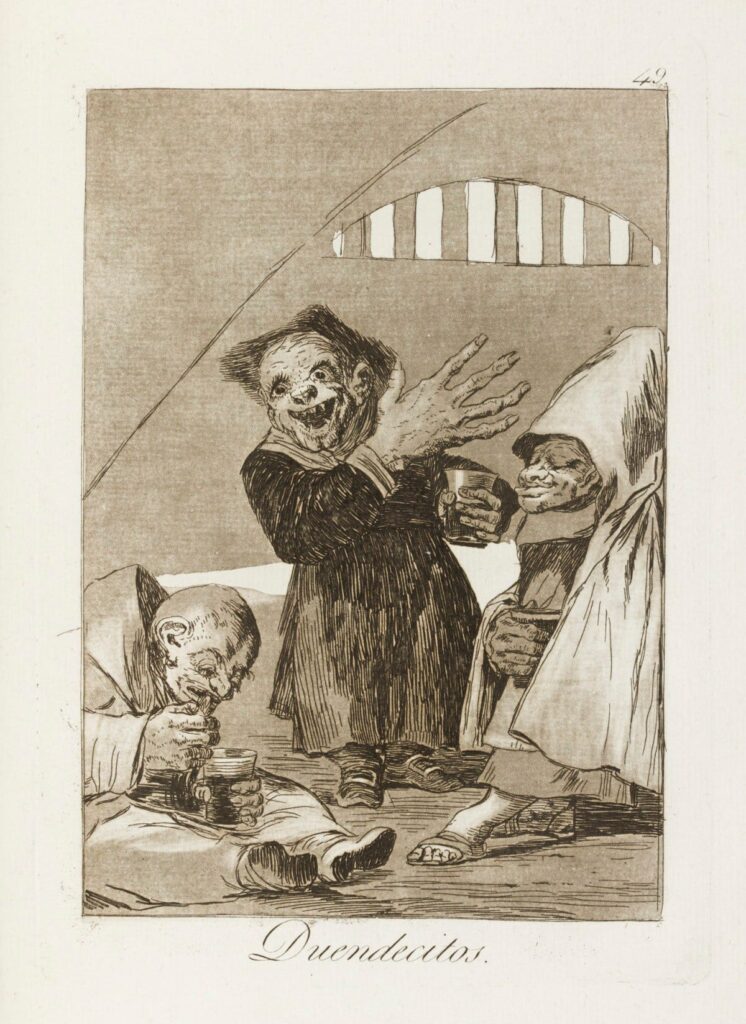Marian Henel—Tapestries and Madness
Marian Henel’s tapestries are huge. The largest one measures over 6 m in length and 3 m in width (19 ft. 8 in. by 9 ft. 10 in.). Created in the...
Zuzanna Stańska 25 November 2024
Los Caprichos are some of the most disturbing of Francisco Goya’s works. A sharp critique of society and its values, there are plenty of monsters haunting these engravings. Here are five of the scariest Caprichos for Halloween.
Francisco Goya’s oeuvre is anything but samey. Whether painting or printmaking, his work is not only celebrated for its mastery but hailed for its relevance, influence, and political message. Los Caprichos (The Caprices) are no exception.
They are a set of 80 etchings and aquatints (a printmaking process similar to etching) published as a collection in 1799. The subjects are often monstrous and otherworldly, yet behind the distressing nature of the scenes is harsh criticism of society and societal values. No one is immune to Goya’s sharp observations—not the political establishment, religious institutions of the time, nor even everyday people. There is an abundance of horror and gore in Goya’s Caprichos. Here are 5 of the scariest to inspire your Halloween.

Francisco Goya, Capricho No. 3: Que viene el coco (Here Comes the Bogeyman), 1799, Museo del Prado, Madrid, Spain.
The title says it all. In Capricho No. 3 a masked figure is terrifying two small children, who clutch on to their mother. The identity, features, and intentions of the bogeyman are left to the viewer’s imagination, but the faces of the other characters hint that nothing good is happening.

Francisco Goya, Capricho No. 43: El sueño de la razón produce monstruos (The Sleep of Reason Produces Monsters), 1799, Museo del Prado, Madrid, Spain.
Perhaps the most famous print of the series, it features a man (probably Goya himself) asleep on his desk. Behind him, a swarm of bats, owls, and monstrous creatures rises up and looms over him. The title of the piece is visible on the desk and is a warning as much as an ode to Enlightenment ideals of reason and logic.

Francisco Goya, Capricho No. 45: Mucho hay que chupar (There is Plenty to Suck), 1799, Museo del Prado, Madrid, Spain.
In Capricho No. 45, a group of witches congregates around a basket of babies. Goya used the figure of the witch in several works of the series as a symbol of ignorance and evil. The title is a dark hint at what the witches have in mind.

Francisco Goya, Capricho No. 49: Duendecitos (Hobgoblins), 1799, Museo del Prado, Madrid, Spain.
Across the series, Goya uses goblins as a symbol of the church and in particular, the Inquisition which was very active in his time. Here, three goblins can be seen consorting in a circle whilst drinking. With their monstrous features and out-of-proportion claws, they are truly terrifying.

Francisco Goya, Capricho No. 68: Linda maestra (Pretty Teacher), 1799, Museo del Prado, Madrid, Spain.
Another witch-themed print in the series, here an older witch is initiating a younger one to their practices. Accompanied by an owl, they are seen attempting to fly on a broom—a relatively conventional way of portraying witches but no less scary.
DailyArt Magazine needs your support. Every contribution, however big or small, is very valuable for our future. Thanks to it, we will be able to sustain and grow the Magazine. Thank you for your help!